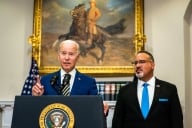You have /5 articles left.
Sign up for a free account or log in.
Two of the three national unions that organize faculty members announced Wednesday that they plan a joint campaign to organize more faculty members and other employees at public research universities.
The announcement by the American Association of University Professors and the American Federation of Teachers follows months of negotiations on the deal. Jointly run local chapters are not new in and of themselves -- the AAUP and AFT have seven joint locals (and other locals are jointly run with the National Education Association). But a national joint organizing campaign will be new.
The targets -- public research universities -- are also significant. While union leaders declined to name specific institutions, citing the need to consult with professors on those campuses first, they were clear that they are going after flagship campuses. Generally, faculty members at community colleges and regional universities have been more likely than their counterparts at research universities to seek collective bargaining. A variety of theories have been put forth for this: Research university faculty tend to earn more money, enjoy more prestige and be more likely to supervise graduate students -- all factors that may make them less likely to seek union representation.
Leaders of the AAUP and AFT believe that changed circumstances in higher education, and the gains of joint organizing, may make a difference. Ernst Benjamin, general secretary of the AAUP, said in an interview that the AFT "brings greater resources and size and in some states brings political connections and ties to the trade union movement," while the AAUP brings "a lot of experience with research universities, a lot of experience with higher education policies." The AAUP has both union and non-union functions, and at many of the campuses likely to be targets, the AAUP has non-union chapters already in place, focused on issues such as academic freedom.
Sandra Schroeder, head of the AFT's higher education council and president of AFT Washington State, said that "no one has been terribly successful individually in unlocking those campuses, and we think this will have some appeal." Her take on the strengths of the two groups: The AFT "is seen as politically active, with lots of clout," and the AAUP is "seen as more professorial."
Schroeder and Benjamin both declined to say how many universities the unions would seek to organize. "We don't have a number in mind," Schroeder said, adding that the number will be "as many as we possibly can."








